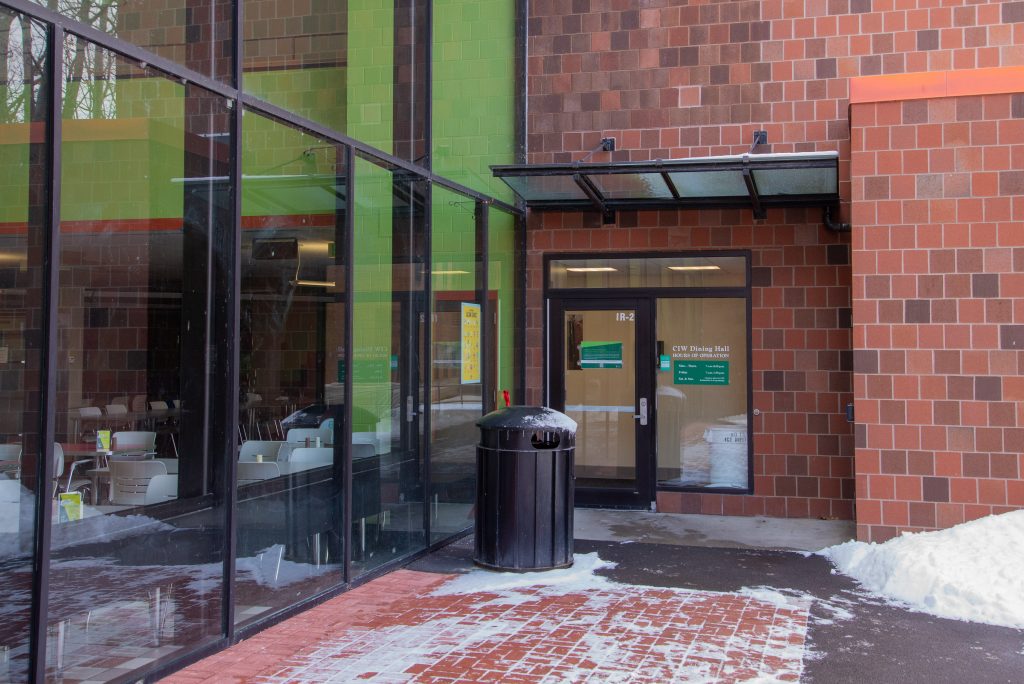As students return back to campus for the new semester, College-in-the-Woods residents have once again lost access to their dining center.
The College-in-the-Woods Dining Center’s services will be suspended to residents during the beginning of the spring 2022 semester in order to support students who might face isolation, according to a Jan. 20 B-Line News Addition. The dining center is prepared to be used for meal preparation and packaging for students who might have to be isolated or quarantined in Old Rafuse Hall. The dining hall will remain closed until further notice, while the Appalachian Collegiate Center, Chenango Champlain Collegiate Center (C4) and Hinman Dining Center remain open.
Last spring, Binghamton University also closed the College-in-the-Woods Dining Center for over a month to support the rising number of students in isolation and quarantine housing early in the semester.
While the decision last year was a reactive policy to the rapid spike in cases, Deanne Ellison, director of Auxiliary Services, said the closure of the College-in-the-Woods Dining Center was out of precaution if the University sees a high amount of COVID-19 cases and students in isolation.
“The difficult decision to temporarily suspend regular dining operations in [College-the-the-Woods Dining Center] has been made to ensure [BU] Dining Services [(BUDS)] is able to meet what could be a significant demand for isolation housing that may come from arrival testing,” Ellison wrote in an email. “Suspending regular operations in [College-in-the-Woods Dining Center] creates the much-needed capacity for [BUDS] to provide meal support to isolation students while maintaining a superior level of service in our three largest dining halls.”
Ellison said the closure of the dining hall is not definite.
“If we have low positivity during arrival testing and the first weeks of classes and become confident the level of support for isolation and quarantine meals is manageable while operating a full-service dining hall, then we will look forward to returning [College-in-the-Woods Dining Center] to regular dining operations as quickly as possible,” Ellison wrote.
The closure of the dining center has caused some students to walk greater distances for access to food. Kaitlyn Gargano, a College-in-the-Woods resident and a sophomore majoring in mathematics, described her experience.
“When I want to go get food, I have to walk to much farther dining halls, which doesn’t seem like a huge deal unless taking the weather into consideration,” Gargano wrote. “Me and my roommate have been walking a significant distance through very cold weather as well as snow every time we want to eat, when we normally would just have to walk two minutes to the [College-in-the-Woods Dining Center].”
Another College-in-the-Woods resident, Robert Sallai, a sophomore double-majoring in history and philosophy, politics and law, said he believes that while it is important to help isolated and quarantined students, there could be better options than closing College-in-the-Woods Dining Center.
“I’m generally disappointed by the closing of [College-in-the-Woods Dining Center],” Sallai wrote in an email. ”I feel like closing C4 would have made more sense as it’s significantly larger than [College-in-the-Woods Dining Center] and would have a better infrastructure for providing food to students in isolation. Although I’m disappointed, I still think it’s important for the University to try and provide for the students in isolation considering some of the events that happened last year or so.”
Gargano said she understands the University’s intentions but believes the repeated closure of College-in-the-Woods Dining Center is unfair to residents of the community.
“I understand the intentions behind closing the dining hall, as quarantined students need to eat, but I think that it is an unfair solution to completely close the [College-in-the-Woods Dining Center],” Gargano wrote in an email. “This dining hall already experienced this last spring, and was already closed for the whole weekend in the fall. With slippery sidewalks and stairs, it seems unfair that we pay for housing and dining (which is very expensive) and are the only living community to continuously lose the opportunity to get food where we live.”
According to the Jan. 26 SUNY COVID-19 Case Tracker, the rolling seven-day positive COVID-19 cases were reported at 56 from among 7,309 tests the past week, a 0.77 percent rate. Up-to-date numbers can be found here.



